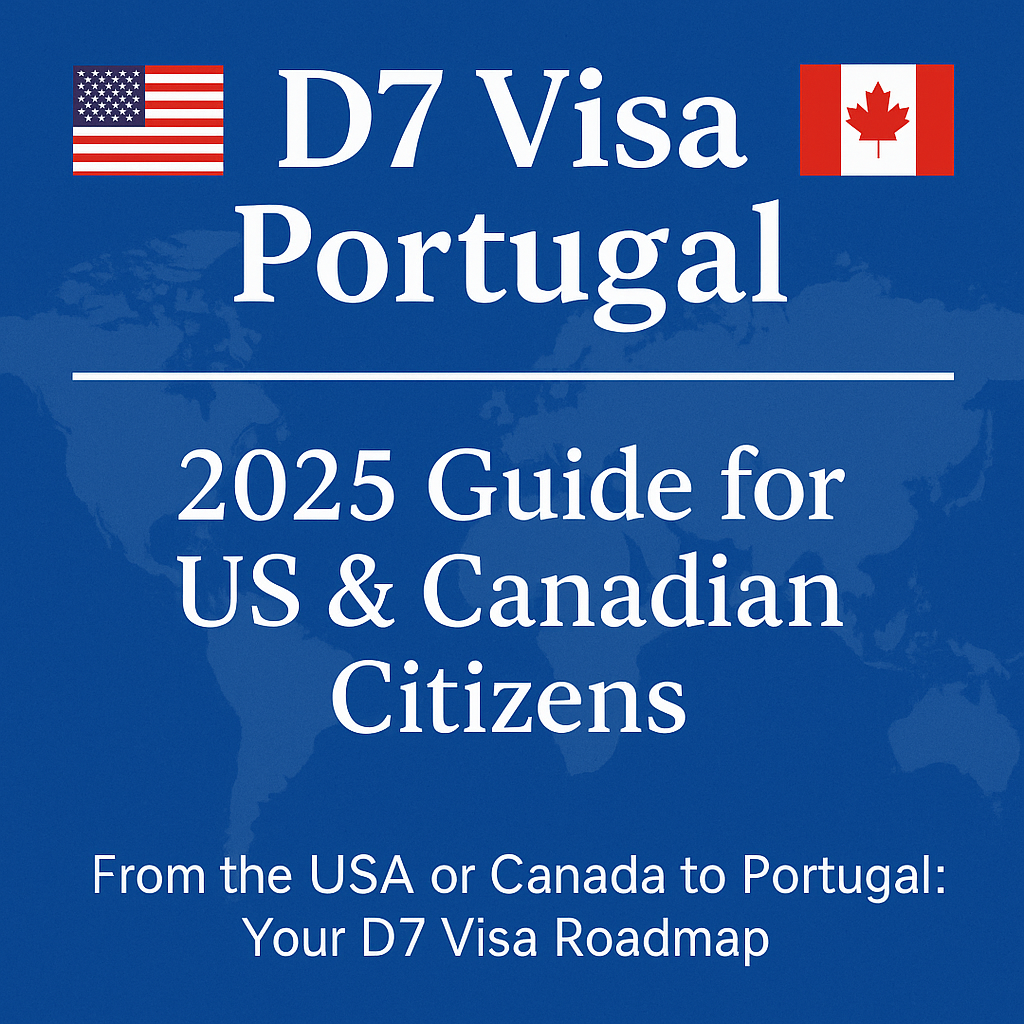From the USA or Canada to Portugal: Your D7 Visa Roadmap
The Portugal D7 Visa, often called the Passive Income Visa, is one of the most popular residency pathways for Americans and Canadians looking to relocate to Europe. Designed specifically for individuals with stable passive income, it provides a clear route to residency and, eventually, citizenship.
This roadmap will guide you through everything you need to know — from eligibility and requirements to the application process and life in Portugal.
1. What Is the D7 Visa?
The D7 Visa is a Portuguese residency visa for non-EU/EEA/Swiss citizens who can financially support themselves without relying on active employment.
Qualifying income sources include:
- Pensions or retirement benefits
- Rental income from real estate
- Dividends from investments
- Interest from savings or bonds
- Royalties
Important: Income from active work, even if done remotely for foreign clients, does not qualify for the D7. Those applicants should consider the D8 Visa instead.
Key benefit (current rules):
After five years of legal residence under the D7 Visa, you can apply for Portuguese permanent residency or citizenship, gaining visa-free travel to over 180 countries. This is currently one of the more direct citizenship paths in the EU, though a proposal is pending that could extend the required residency period.
2. Why the D7 Visa Appeals to US and Canadian Citizens
- Lower cost of living compared to most North American cities
- High quality of life, with excellent healthcare, safe cities, and a warm climate
- One of the more direct citizenship paths in the EU under current rules
3. D7 Visa Eligibility Requirements (2025)
To apply for the D7 Visa, you must meet certain criteria:
- Nationality: Be a non-EU/EEA/Swiss citizen (US and Canadian citizens qualify).
- Income: Demonstrate passive income meeting the following minimum thresholds:
- Main applicant: €870/month (€10,440/year)
- Spouse: +50% → €435/month (€5,220/year)
- Dependent child: +30% → €261/month (€3,132/year)
- Accommodation: Proof of accommodation in Portugal (rental contract, property deed, or invitation letter).
- Criminal Record: Clean record from your home country and any country of residence in the past year.
- Insurance: Health insurance covering at least €30,000.
4. Step-by-Step D7 Visa Application Process
Step 1: Gather Required Documents
Typical documents include:
- Completed D7 Visa application form
- Valid passport (6+ months beyond intended stay)
- Proof of passive income (bank statements, pension letters, dividend reports)
- Proof of accommodation in Portugal
- Health insurance policy
- FBI/RCMP criminal record check
- Two passport photos
- Motivation letter
Step 2: Apply at the Portuguese Consulate
US and Canadian applicants must submit their application to the Portuguese consulate serving their jurisdiction. Some consulates require in-person appointments; others accept mailed applications.
Step 3: Visa Approval and Temporary Permit
If approved, you’ll receive a 4-month visa allowing you to enter Portugal and attend an appointment with AIMA (Portuguese immigration authority) to receive your 2-year residence permit.
Step 4: Renew and Maintain Residency
The first residence permit is valid for 2 years. You can renew for 3 years, then apply for permanent residency or citizenship.
5. How Long Does the Process Take?
Processing times vary:
- Consulate stage: 2–4 months on average
- AIMA appointment: 1–3 months after arrival in Portugal
Tip: Apply early, as some consulates have long appointment backlogs.
6. Common Challenges and How to Avoid Them
- Income not meeting passive criteria → Only include pensions, investments, rentals, or similar. Exclude active work earnings.
- Accommodation issues → A signed rental contract or property deed is best; temporary bookings are often rejected.
- Criminal record delays → Request FBI or RCMP checks early, as processing can take weeks.
7. Life in Portugal on a D7 Visa
Once settled, D7 residents enjoy:
- Access to the Portuguese public healthcare system
- Ability to engage in permitted business or work activities in Portugal (optional, but not a requirement for visa approval)
- Freedom to travel within the Schengen Area for up to 90 days in any 180-day period
- A vibrant expatriate community in cities like Lisbon, Porto, and Lagos
8. D7 Visa vs. D8 Visa
While the D7 Visa is exclusive to passive income, the D8 Visa (Digital Nomad Visa) is for individuals with active remote work income.
D8 Visa minimum income requirement (2025):
- Main applicant: €3,480/month (€41,760/year)
- Spouse: +50% → €1,740/month (€20,880/year)
- Dependent child: +30% → €1,044/month (€12,528/year)
The D8 is better suited for employees or freelancers working remotely for companies or clients outside Portugal.
9. Frequently Asked Questions
Q: Can I bring my family?
Yes. Spouses and dependent children can be included in your application.
Q: Do I have to live in Portugal full-time?
No. To keep your residence permit valid, you must not be absent from Portugal for more than 6 consecutive months or 8 non-consecutive months during the permit’s validity period, unless you have justified reasons accepted by AIMA.
Q: Can I buy property instead of renting?
Yes. A property deed satisfies the accommodation requirement.
10. Why Work With an Immigration Lawyer
While the D7 process is straightforward on paper, in practice it can involve delays, document rejections, and unclear consular requirements. A lawyer can:
- Ensure your application meets the consulate’s standards
- Secure legally valid translations and apostilles
- Handle family reunification applications
Final Thoughts
The D7 Visa is an excellent route for those with passive income, while the D8 serves remote workers with higher active earnings. Both visas can lead to permanent residency and citizenship — though a pending proposal could extend the citizenship timeline. With the right preparation and legal guidance, the process can be smooth and stress-free, opening the door to a new life in Portugal.

